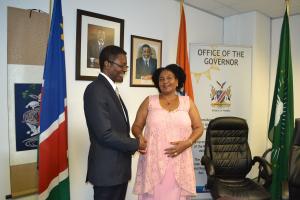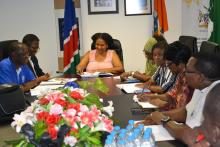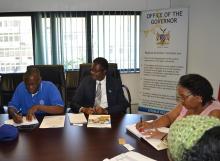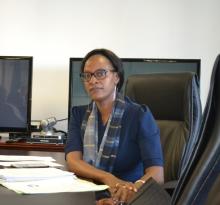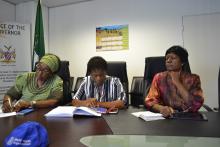WHO mobilizes regional and local authorities to support the National Response Plan for the Hepatitis E Outbreak
WHO Country Representative in Namibia, Dr Charles Sagoe-Moses paid a courtesy call to the Regional Governor of the Khomas Region, Honorable Laura Mcleod-Katjirua to harness her office support to the Hepatitis E Outbreak. In welcoming the WHO delegation, the Governor expressed her office’s and the regional council’s demonstrated committed to containing the outbreak. She informed the meeting that upon return from the Christmas break they consulted with the City Council to update themselves on the status of the outbreak and the response. She further participated in the City of Windhoek’s clean-up campaign in one of the affected communities. She expressed her dismay at a sewerage drain which was overflowing and appeared to have been in this state for a while. Although the city official seemed to be aware of this, they did not act to unblock the sewerage and she attributes the outbreak in the community to this sewerage. She told the meeting that she intends to have a follow-up visit to the same area to monitor progress. The governor informed the meeting that the Regional Council has committed N$ 2 million to compliment the efforts of the City of Windhoek in providing additional sanitation facilities and water points in the affected informal settlements.
The WHO Representative thanked the Governor and her office for the political leadership and commitment demonstrated towards reducing the risks related to the Hepatitis E outbreak. He said that his intention in approaching her office was to find practical and concrete solutions to the problem. He stated that the response is two-fold: at the hospital and the community, but most importantly at community level. As much as the provision of safe water and sanitation is inadequate, the usage of polluted water from contaminated water sources and open defecation are practices which can be addressed at community level. In addition, personal and environment hygiene are behaviors which may be influenced by culture and perceptions and are best addressed through behavioral campaigns and community engagements. He commended the political leaders in the communities who have mobilized leaders and communities at large to increase level of awareness on the risk factors. These communities have also been engaged in the ongoing environmental clean-up campaigns. He stressed the importance of continuing this engagement especially with construction of sanitation facilities, referring to the UNICEF’s community-led sanitation approach which has proved to increase community ownership and maintenance of these facilities. ‘Since sanitation is cultural it is imperative to get total buy-in from the community in order to sustain the investment being made in containing the outbreak’, he emphasized. He assured the Governor and her team of WHO’s continued support.
The meeting was attended by the Special Advisor to the governor Mrs. Subiya, the Chairperson of the Regional Council Management Committee, Honorable Rachel Jacob, the Deputy Mayor of the City of Windhoek, Her Worship Councilor Teckla Uwanga, the Chief Regional Officer of the Khomas Regional Office Mr Mafwila and the Head of the Health from the City of Windhoek Mrs. Mary-Anne Kahitu.



